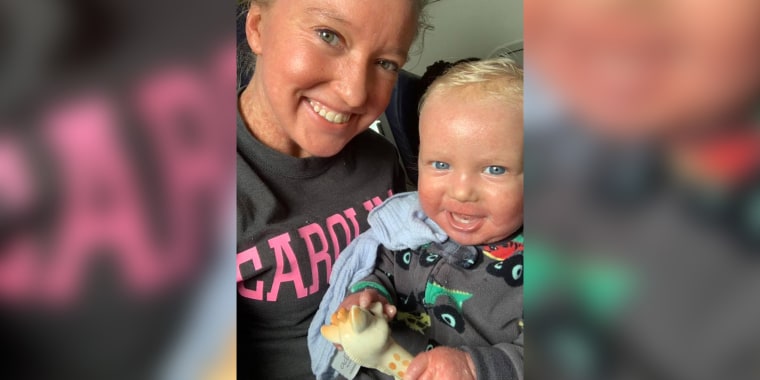A woman with a rare genetic condition that causes dry, scaly skin says she was humiliated on a recent flight when the airline became concerned about her appearance and asked her and her infant son to leave the plane.
Jordan Flake, of West Columbia, South Carolina, was reportedly flying on American Airlines from El Paso, Texas, to Dallas last week — on her way home after visiting her husband — when the incident took place.
Flake declined a TODAY request for an interview, but she described the experience in several posts online.
“Before takeoff, an employee from the airline came up to my row and asked the 2 men sitting next to me to get up. He then quietly asked me about ‘my rash’ and if I had a letter from a doctor stating it was ‘OK for me to fly.’ I explained to him it was called ichthyosis, a genetic skin condition I share with my son,” she wrote.
“He came back and said he apologized, but we ‘wouldn’t be able to fly,’ and we ‘had to get off the plane.’”
The airline arranged a new flight with a different carrier, Flake wrote, noting she has never been told by a doctor that she needed documentation showing her condition is not contagious. The incident happened on Rare Disease Day, Feb. 28, which added to her frustration: “I have never been so humiliated in my life,” she wrote.
Such appearance discrimination incidents are “very disconcerting” and show that more awareness and sensitivity training are needed, said Moureen Wenik, executive director of the Foundation for Ichthyosis and Related Skin Types, in a statement.
“The skin disorder is neither contagious, nor causes any threat to the public,” Wenik noted.
American Airlines said it has talked with Flake directly, upgraded the family on their next American flights and refunded the cost of the trip.
“Our goal at American Airlines is to create a welcoming environment for all of our customers. We sincerely apologize to Ms. Flake and her son for the experience they had last Thursday, and our team has begun an investigation into the matter,” the airline said in a statement to TODAY.
What is ichthyosis?
The name refers to a group of skin diseases that cause extremely dry, thick, and scaly skin that can resemble fish scales, according to the American Academy of Dermatology. Of the 20-plus types of ichthyosis, the vast majority of people who have it develop ichthyosis vulgaris, which is the mildest form and usually begins in childhood.
The inherited condition is caused by a genetic mutation that disrupts the lifecycle of skin, the Genetic and Rare Diseases Information Center noted.
Normally, the body grows new skin cells and sheds dead ones every day. But with ichthyosis, new skin cells either grow faster than the body can shed them, or the rate of shedding is slower than normal, which leads to a build-up of dry scaly skin.
The genetic mutation is passed from parent to child, with about 16,000 babies born with some form of ichthyosis each year, according to the Foundation for Ichthyosis and Related Skin Types. About one out of 80 people are affected by ichthyosis vulgaris, though it can often go undiagnosed when it’s mild, it noted.
Ichthyosis is not contagious.
What are the complications of ichthyosis?
Ichthyosis vulgaris can be a nuisance, but it rarely affects overall health, the Genetic and Rare Diseases Information Center noted.
Still, some ichthyosis patients may not be able to sweat normally, so they could overheat. They may also experience painful skin tightness, cracking of the skin, itching and other physical problems.
How is ichthyosis treated?
There is no cure, but the condition can be managed with the help of heavy duty moisturizers. Patients may use creams that contain alpha hydroxy acids to help to control the scaly skin.

